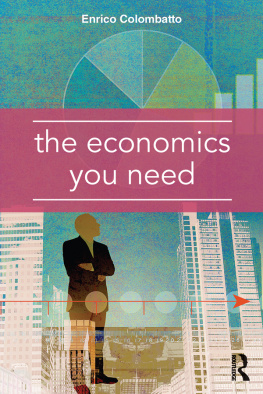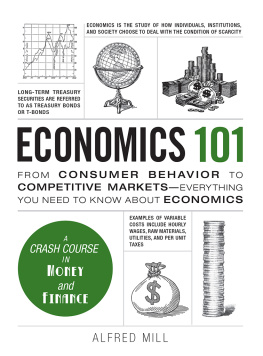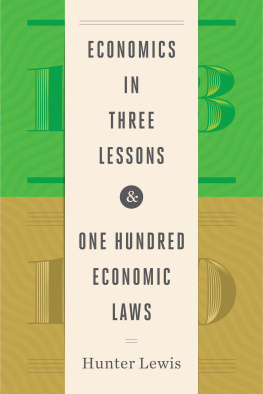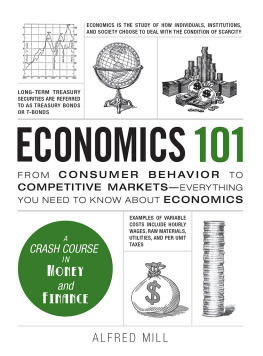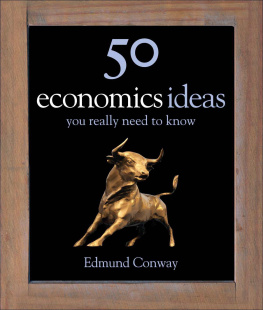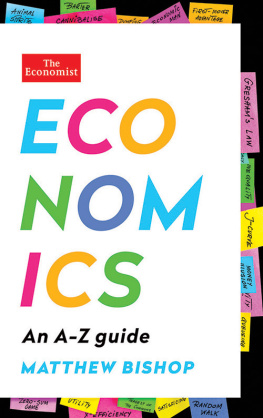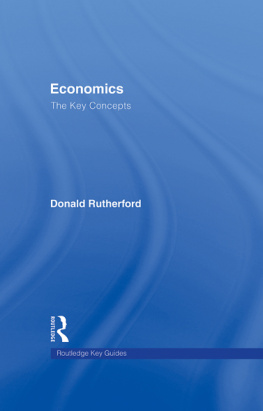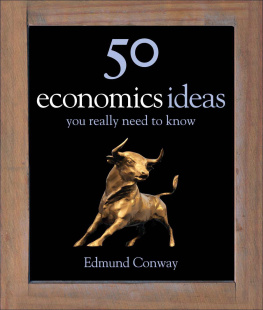THE ECONOMICS YOU NEED
This short book offers a rigorous yet user-friendly introductory guide for students who need to grasp the essential concepts of economics quickly. It provides a serious, clearly understandable and systematic account of the key elements of economics, with a focus on theory and principles.
The Economics You Need provides the ideal introduction for students approaching economics from other academic disciplines, as it uses only a limited amount of economics jargon, and is constructed so that several chapters can be read independently of the others. This book is structured around the premise that a set of theoretical steps are necessary for understanding economics as a way of thinking, rather than as a set of solutions. It also encourages the reader to consider alternatives to common assumptions, to acknowledge the need for value judgements and to foster fresh thinking in an imperfect world.
This engaging primer will be essential reading not only for students of economics, but also for students with a background in disciplines such as politics, law, international relations and business studies.
Enrico Colombatto is Professor of Economics at the University of Turin,Italy, where he teaches Foundations of Policymaking, InternationalEconomics, and Growth and Development. He is the head of research atIREF (Institut de Recherches conomiques et Fiscales, Luxembourg) and aSenior Fellow at GIS (Geopolitical Information Service, Liechtenstein).
THE ECONOMICS YOU NEED
Enrico Colombatto
First published 2016
by Routledge
2 Park Square, Milton Park, Abingdon, Oxon OX14 4RN
and by Routledge
711 Third Avenue, New York, NY 10017
Routledge is an imprint of the Taylor & Francis Group, an informa business
2016 Enrico Colombatto
The right of Enrico Colombatto to be identified as author of this work has been asserted in accordance with the Copyright, Designs and Patent Act 1988.
All rights reserved. No part of this book may be reprinted or reproduced or utilised in any form or by any electronic, mechanical, or other means, now known or hereafter invented, including photocopying and recording, or in any information storage or retrieval system, without permission in writing from the publishers.
Trademark notice: Product or corporate names may be trademarks or registered trademarks, and are used only for identification and explanation without intent to infringe.
British Library Cataloguing in Publication Data
A catalogue record for this book is available from the British Library
Library of Congress Cataloging in Publication Data
Names: Colombatto, Enrico, author.
Title: The economics you need / Enrico Colombatto.
Description: Abingdon, Oxon ; New York, NY : Routledge, 2016.
Identifiers: LCCN 2015040251 (print) | LCCN 2015042933 (ebook) |
ISBN 9781138963108 (hardback) | ISBN 9781138963115 (pbk.) |
ISBN 9781315658988 (ebook) |
Subjects: LCSH: Economics.
Classification: LCC HB171 .C764 2016 (print) |
LCC HB171 (ebook) | DDC 330--dc23
LC record available at http://lccn.loc.gov/2015040251
ISBN: 978-1-138-96310-8 (hbk)
ISBN: 978-1-138-96311-5 (pbk)
ISBN: 978-1-315-65898-8 (ebk)
Typeset in Bembo
by Saxon Graphics Ltd, Derby
CONTENTS
I am grateful to many friends and colleagues for having read parts of this book. In particular, Stefano Adamo, Fabio Bagliano, Emiliano Brancaccio, Claudio Campanale, Christine Henderson, Paul Lewis, Henry Manne (), Mario Pagliero, Simone Pellegrino, Mario Pezzino, Ben Powell, Valerio Tavormina, Larry White who offered valuable suggestions, criticisms, and helped me improve the substance and the presentation of these chapters.
Economics studies how people behave and interact in order to improve their well-being in an environment characterised by scarcity. While economics as a field of study dates only to the eighteenth century, humankind has always been confronted with economic problems, as long as labour has been necessary for survival and the supply of resources has been smaller than the demand for them. Over the long course of human development, we have made huge progress, by learning to make the right choices, to cooperate, and to take advantage of our talents and intuitions in order to produce increasingly large amounts of goods and services. As a result, we have been remarkably successful in alleviating the scarcity constraint, avoiding starvation, and enhancing both our life-expectancy and our well-being.
Certainly, this development has not always been a smooth process. Many mistakes have been committed, especially when groups of individuals have resorted to fraud and violence to force other individuals to go against their preferences and their beliefs, or when looting has been more profitable than working. Yet, it is indisputable that most people today enjoy standards of living that would have been unimaginable even one or two centuries ago.
It is also true that interest in economic matters has increased significantly among all layers of the population in recent years. Why has this happened? On the one hand, our ambitions have risen: we expect our living standards to increase steadily, and we are interested in knowing how to make these expectations come true. On the other hand, we become increasingly concerned when we suffer setbacks, and when we feel we have fallen victim to economic mismanagement and are missing opportunities. More generally, we have come to appreciate that the fight against scarcity is not just a matter of happenstance and good luck. Humankind is by no means condemned to stagnation or even disaster, should the natural resources at its disposal be depleted. Rather, we are now aware that alleviating scarcity depends on our ability to avoid wastages, and to create new wealth through technological progress and entrepreneurship.
Since the eighteenth century, we also have learned that human behaviour in the presence of scarcity follows fairly regular patterns which can be studied and explained, and the consequences of which go beyond what the uneducated observer might at first glance perceive. Certainly, the economic interactions in which most people engage today are considerably more complicated than those in which the average individual engaged in the eighteenth century, yet the insights inherited from the founders of modern economics remain valuable. Loyal to this early heritage, our purpose is to investigate and help the reader to understand the key categories of economic actions, in all of their complexity: savings, consumption, production, competition, regulation, money, specialisation, currency trade, and booms and busts. As the reader will see, economic actions can be explained by individuals efforts to improve their conditions, and the process through which they strive to reach their goals has always been a matter of opportunity costs, a synonym for exchange driven by choice.
The purpose of The Economics You Need is to guide the reader through this journey into the world of economic thinking, a world which can appear complicated, but which need not be hopelessly complex. With the aim of untangling some of these complexities, we have done our best to keep our story simple, but not simplistic. This explains why the reader will find no maths and no footnotes, and only a few straightforward figures. Thus, no previous technical skills are required to understand the ideas developed in these pages. Since we have preferred to give priority to the fundamental concepts and mechanisms that characterise the economic mental framework, we have made use of simple examples to illustrate the passages that are less intuitive. Hence, we have avoided lengthy references to the complex situations that characterise the real world, situations that would have forced us to engage in lengthy digressions, and that would have certainly necessitated risky forays into other disciplines. Likewise, we have also decided to avoid the debates regarding the goals and nature of economic policy-making, because these debates lie beyond economics, strictly speaking. In other words, this book will help the reader learn how economists think and what kind of tools they use. Evaluating the merits of choice and the desirability of the results is clearly important, but it is an entirely different exercise, and should not be confused with economics. Economics explains and is a value-free science.

